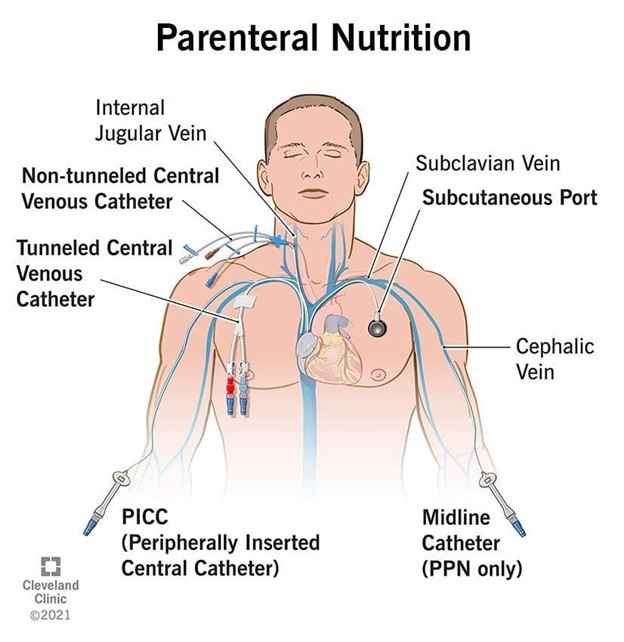A nurse is teaching a client who has a new prescription for total parenteral nutrition through a central line. Which of the following information should the nurse include in the teaching?
"I will change your IV tubing once every 48 hours."
"Abdominal distention is an expected effect of this therapy."
"I will need to check your gastric residual before administering feedings."
"I will need to measure your weight daily."
The Correct Answer is D

- A is incorrect because IV tubing for total parenteral nutrition should be changed every 24 hours to prevent infection.
- B is incorrect because abdominal distention is not an expected effect of total parenteral nutrition. It could indicate a complication such as fluid overload or bowel obstruction.
- C is incorrect because gastric residual is not relevant for total parenteral nutrition, which bypasses the gastrointestinal tract.
- D is correct because weight measurement is an important indicator of fluid balance and nutritional status for clients receiving total parenteral nutrition.
Nursing Test Bank
Naxlex Comprehensive Predictor Exams
Related Questions
Correct Answer is A
Explanation
Choice A rationale:
Preschoolers with celiac disease need to avoid gluten-containing grains such as wheat, barley, and rye. Corn tortilla with black beans is a suitable option as it does not contain gluten and provides essential nutrients.
Choice B rationale:
Whole wheat pasta contains gluten, which should be avoided by individuals with celiac disease. This option is inappropriate for the preschooler with celiac disease.
Choice C rationale:
Low sodium vegetable soup with barley contains gluten, which is not suitable for a child with celiac disease. Barley is a gluten-containing grain and should be avoided.
Choice D rationale:
Rye bread contains gluten and is not appropriate for a preschooler with celiac disease. This option is not suitable for the child's dietary needs.
Correct Answer is D
Explanation
Whether you are a student looking to ace your exams or a practicing nurse seeking to enhance your expertise , our nursing education contents will empower you with the confidence and competence to make a difference in the lives of patients and become a respected leader in the healthcare field.
Visit Naxlex, invest in your future and unlock endless possibilities with our unparalleled nursing education contents today
Report Wrong Answer on the Current Question
Do you disagree with the answer? If yes, what is your expected answer? Explain.
Kindly be descriptive with the issue you are facing.
